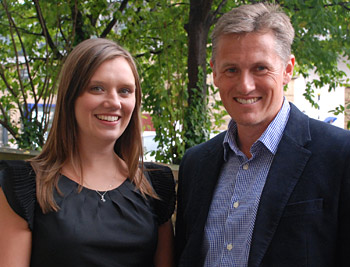Sydney Institute of Criminology
Thu, 04 Oct 2012 11:29:00 BST
Sydney Institute of Criminology MoU first step to future research links
THE deterrence, detection and reduction of crime by methods that include CCTV networks, restorative justice and building design will be among the topics at the heart of a research partnership newly forged between criminology experts at the University of Huddersfield and their counterparts in Sydney.

(Leanne Monchuk with Garner Clancey, Deputy Director of the Sydney Institute of Criminology)
The sheer distance between the UK and Australia will be shrunk by the use of video links for conferences and lectures. But there will be personal contact too between the Applied Criminology Centre (ACC) at Huddersfield and the Institute of Criminology (IoC) at the University of Sydney, now that a Memorandum of Understanding has been signed between the two departments.
Members of the ACC – Dr Rachel Armitage and Leanne Monchuk – have visited Australia for research. And back in the UK, Leanne (above) has delivered a video link lecture to postgraduates in Sydney, on the topic of ‘designing out’ crime.
Now, the leading Australian criminologist Garner Clancey, of Sydney’s IoC, has completed a fact-finding visit to the UK, hosted by the Applied Criminology Centre. His two-week trip culminated in a guest lecture to University of Huddersfield students in which he provided an overview of current key issues in Australian criminology.
“I was very keen to convey the tyranny of distance in Australia and how that affects the delivery of criminal justice,” he said. Other topics in the lecture alcohol-related crime and the relationship between Australia’s indigenous and non-indigenous peoples.
There are plans for Mr Clancey to deliver a video lecture to Huddersfield students. Restorative justice – which was pioneered in Australia and New Zealand – is a likely theme.
CCTV cameras
Meanwhile, the use of CCTV cameras has already been the basis of research collaboration between the Huddersfield and Sydney criminologists, with the ACC contributing to an Australian consultancy project on the topic.
The use of CCTV is considerably more advanced in Britain, known as one of the most-watched countries in the world.
“We in Australia tend to be a little bit more reflective and circumspect about it,” said Mr Clancey, although there was considerable “upward pressure” to install camera networks.
“We have not had the same level of funding to encourage it. The benefit of us partnering with the ACC for such a consultancy project is that they are experts in this area, by virtue of being in the UK but also because of the research they have previously done.”
There are many points of intersection between the work of the ACC and the Institute of Criminology at Sydney University, said Mr Clancey. They include a special interest in the practice and principles of designing out crime.
But while in the UK, Mr Clancey observed considerable differences between the two countries in the approach to crime and policing. For example, Britain was considerably more advanced in intelligence-led policing and there was greater integration between police and agencies such as drug intervention teams and child protection workers.
However, Australia had a much more centralised policing system, which could be more streamlined as a result.
“While in the UK I have been very struck by diversity of practice across policing boundaries,” said Mr Clancey. “That can be a recipe for innovation but also a recipe for considerable duplication.”
Further collaboration
The signing of the Memorandum of Understanding between the Applied Criminology Centre and the Sydney Institute of Criminology will mean further research projects and joint publication of findings. Soon to appear is a journal article co-authored by Garner Clancey and Leanne Monchuk which compares and contrasts the delivery of crime prevention in England and New South Wales.
Leanne commented: “Garner’s visit was a great opportunity to showcase the applied nature of our work here at the ACC. Although we have already successfully achieved a number of the elements outlined in the MoU, I am excited by the further opportunities his visit has created.”

Dr Armitage, who Reader in Criminology and Deputy Director of the Applied Criminology Centre at the University of Huddersfield, added that: “the signing of the MoU and Garner’s visit has sealed the excellent partnership between the Sydney Institute of Criminology and the ACC.
“Our visit to Sydney earlier this year marked the commencement of this partnership, and we were able to explore the process of reducing crime within New South Wales, but also share our knowledge of crime prevention and discuss areas in which we could work together.
“Garner’s visit has allowed our team to reciprocate the warm hospitality that we received. Garner has visited many police forces and local authorities in an attempt to gather information on crime reduction practices within the UK. We look forward to future research and consultancy collaborations and also sharing our findings through lectures, conference presentations and joint publications.”







